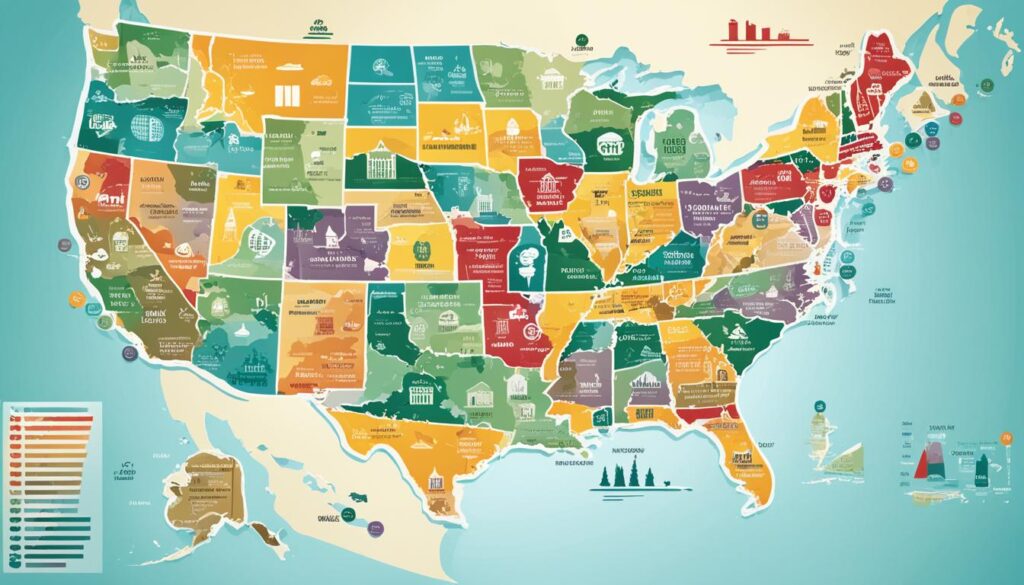Stepping into 2024, the US shows a vivid wealth landscape. It highlights the richest states. This peeks at their economy, luxury, and living standards. By looking at the U.S. Census Bureau and Bureau of Economic Analysis, we see which states are affluent. And we explore what their wealth means. This piece looks at income and factors that boost wealth, aiming to illuminate who gains and how these states stay rich.
Key Takeaways
- The richest states in USA 2024 are ranked based on economic performance and wealth distribution.
- Income levels play a crucial role in determining the affluence of different states.
- The data reflects trends derived from the U.S. Census Bureau and Bureau of Economic Analysis.
- Understanding who benefits from wealth provides critical insights into socioeconomic dynamics.
- Examining these wealth rankings can guide economic planning and investment strategies.
Introduction to Affluence in the USA
Understanding wealth in the United States means looking closely at its social and economic layers. Affluent states show a mix of strengths, like many job opportunities and strong industries. These elements help each state stand out economically, boosting its wealth and success.
The financial patterns of wealthy states relate to past economic ups and downs. For example, California shines in tech and innovation, drawing in talent and investments. Meanwhile, Texas does well with its energy and agriculture. Knowing the history helps us see how these states kept up with economic changes.
Insights from Forbes and The Brookings Institution shed light on the realities of wealth. They show us the importance of technology, industry leadership, and economic stability. This knowledge explains why some states are wealthier, marking their spot on America’s economic map.
Criteria for Ranking the Richest States
Understanding how we rank states’ wealth shows the financial complexity of the U.S. Different measures reflect a state’s economic power. These key factors play a big role in evaluating them.
Factors Influencing Wealth
Many aspects shape the wealth of states. They include:
- Gross State Product (GSP): Shows overall economic activity, measuring a state’s productivity.
- Median Household Income: High incomes mean a wealthier population. This boosts a state’s finances.
- Employment Rates: Low unemployment points to a strong job market, showing economic strength.
- Business Growth Rates: States drawing new businesses see more jobs and income.
Combined, these factors show how wealth is spread among the highest-earning states. By looking at data from trusted sources, we get a better view.
The Role of Income Levels
Income levels are key in deciding state wealth. Higher salaries improve life quality and fuel the economy. Wealthy states usually enjoy:
- More spending, which helps local businesses grow.
- Higher tax money for services and infrastructure.
- Great appeal for talent and investment.
This wealth from high incomes keeps states at the top of the rich list in the USA. For more on wealth ranking, click here.
Overview of the Top Earning States in the US
Looking at the wealth of states shows us who is making the most money. It’s important to know which states are doing well. This helps us see where the best jobs and stable lives are. We see big differences in how much people earn in different places. By understanding these, we can learn a lot about money trends over time.
Understanding State Wealth Distribution
The wealth of a state can depend on many things. For instance, what kind of industries are there, the job market, and schools. California, Texas, and New York lead because they have varied economies and lots of jobs. But, some states find it hard with less money and fewer jobs.
- Californian tech industry driving high incomes.
- Industrial hubs in Texas contributing to economic growth.
- Financial services in New York attracting top talent.
Historical Trends in Income
The way income has changed over time tells us about wealth and stability. Technology and finance have really helped some states recently. But others still depend on old-time industries. This makes us think more about how money levels show the big economic changes.
| Year | California Median Income | Texas Median Income | New York Median Income |
|---|---|---|---|
| 2000 | $56,500 | $49,300 | $58,000 |
| 2010 | $61,000 | $54,000 | $61,500 |
| 2020 | $75,200 | $63,800 | $68,000 |
Looking at this data helps us see big changes in the economy. It shows us where the money is going and what might happen next.
Richest States in USA 2024: A Detailed Look
The richest states in the USA in 2024 will be those with strong financial health. They stand out due to their economic activities and education levels. These elements contribute significantly to their wealth.
For instance, California and New York are at the top because of their booming tech and finance sectors. States like Massachusetts and Maryland, on the other hand, shine because of their high education rates. This draws in talented workers and sparks innovation.
Below, you’ll find a table comparing the richest states. It looks at their income per person and how fast their economies are growing. It also points out what drives their economy.
| State | Per Capita Income ($) | Major Economic Driver | Growth Rate (%) |
|---|---|---|---|
| California | 78,000 | Technology | 5.2 |
| New York | 75,500 | Finance | 4.8 |
| Massachusetts | 73,000 | Education & Healthcare | 4.5 |
| Maryland | 72,500 | Government & Tech | 4.3 |
| New Jersey | 71,000 | Pharmaceuticals | 4.1 |

Looking closely at these states shows how smart policies and investments can spread wealth. Their unique features help not just their own people but the entire country. By studying them, we can understand how to overcome hurdles and grab opportunities for wealth.
Wealthiest States in America: Current Rankings
The wealth landscape in America is always changing. States fight to be at the top of wealth rankings. The richest states show not just high incomes but also strong industry growth that boosts the economy.
Checking the top states gives us a look into wealth and what makes them financially strong.
Top 5 Richest States
| Rank | State | Average Income | Key Industries |
|---|---|---|---|
| 1 | California | $80,000 | Technology, Entertainment, Agriculture |
| 2 | New York | $75,000 | Finance, Media, Technology |
| 3 | Massachusetts | $70,000 | Education, Healthcare, Technology |
| 4 | Washington | $68,000 | Technology, Aerospace, Agriculture |
| 5 | New Jersey | $66,000 | Pharmaceuticals, Technology, Finance |
States Climbing the Wealth Ladder
Texas and Florida are making big moves up the wealth rankings. They have seen huge investments in tech and tourism. These states are growing fast, bringing in people and businesses with good economic policies.
Their ability to bounce back and change shows how wealth in the U.S. is shifting.
Economic Drivers in Affluent States
The wealth of a state is influenced by various factors. These factors play a big part in its growth and stability. Key industries, along with technology and innovation, change old sectors into economic giants.
Industries Powering Wealth Creation
Rich states have different industries that are very important. These sectors stand out:
- Technology: California and Washington are known for tech, bringing jobs and growth.
- Finance: New York is famous for its big financial sector, adding a lot to its income and jobs.
- Healthcare: Massachusetts is leading in healthcare with many biotech firms. This boosts the economy and life quality.
- Manufacturing: Texas shines with strong manufacturing, important for exports and jobs.
The Impact of Technology and Innovation
Technology and innovation are key in rich states’ economies. They help make industries more productive and efficient. Lots of states focus on research, leading to:
- Enhanced Business Models: Tech helps companies improve how they work.
- Job Creation: Tech sectors create high-skill jobs, drawing skilled people.
- Attracting Investment: States that focus on tech and innovation attract both local and global investors.

States with Highest Income in USA: A Comparative Analysis
Looking at the top income states in the USA shows big income differences. The average income points to wealth, but the living cost matters too. It’s important to know how wealth spreads out to get the full picture.
Income Disparities Across the Nation
We see clear income gaps when we look at rich and poor states. States like Maryland and Massachusetts are way above the average. They offer great jobs and education, raising their income levels.
Cost of Living Considerations
A high income doesn’t tell the whole story without living costs in the mix. In cities like San Francisco or New York, a big salary might not go far. Places in the city vs the countryside also affect how much money you really have after housing costs.
| State | Average Income | Cost of Living Index |
|---|---|---|
| Maryland | $84,750 | 130.6 |
| Massachusetts | $82,400 | 135.3 |
| New Jersey | $80,400 | 120.9 |
| California | $78,400 | 149.9 |
| Connecticut | $76,600 | 127.0 |
Understanding both income and living costs offers deeper insights into state living standards.
Regional Wealth Patterns in the United States
The United States’ economic map is drawn by regional wealth, showing how money spreads across the nation. The Northeast and the South show a clear contrast in wealth, affecting growth and policy decisions. The Northeast has higher incomes and wealth, but the South, with its varied economy, is catching up.
Northeast vs. South: A Wealth Contrast
The Northeast is rich, with states like Maryland and Massachusetts leading in how much money people make. On the other side, the South has been behind in wealth but is now growing fast. This difference in wealth shows the complex ways regions build their fortunes, through things like schooling, job types, and new ideas.
Comparing the Midwest and West Coast
The Midwest faces challenges in spreading wealth, with its big factories and farms. But the West Coast, especially places like Silicon Valley, shines with high incomes from tech and startups. This shows the many roads to wealth in America, highlighting the variety in regional economies.